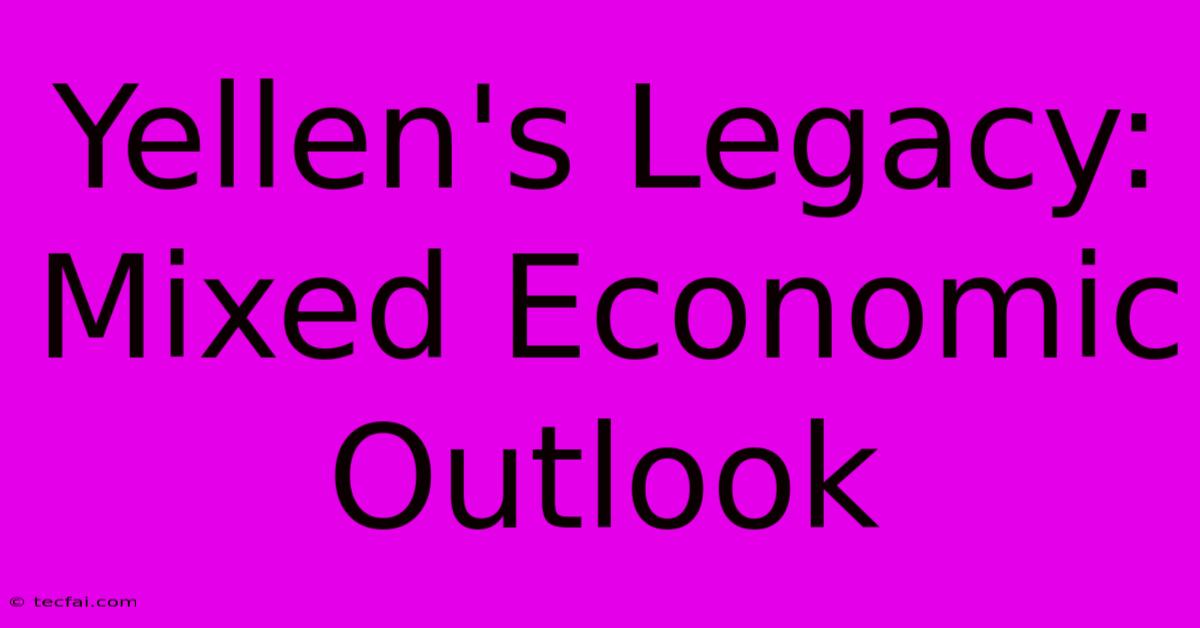Yellen's Legacy: Mixed Economic Outlook

Discover more detailed and exciting information on our website. Click the link below to start your adventure: Visit Best Website tecfai.com. Don't miss out!
Table of Contents
Yellen's Legacy: A Mixed Economic Outlook
Janet Yellen's tenure as Treasury Secretary under President Biden has been marked by a complex and often contradictory economic landscape. While she navigated the country through unprecedented challenges, her legacy remains a subject of considerable debate, with both significant achievements and lingering concerns shaping the overall outlook. This article will delve into the key aspects of her time in office, analyzing both the successes and criticisms surrounding her economic policies.
Navigating Uncharted Waters: The Pandemic Response
Yellen's early focus was undoubtedly on mitigating the economic fallout from the COVID-19 pandemic. Her support for large-scale fiscal stimulus packages, including the American Rescue Plan, was instrumental in preventing a deeper recession and providing crucial relief to individuals and businesses. These measures, while criticized by some for their potential inflationary effects, undeniably helped to cushion the blow of the pandemic's initial impact. The rapid rollout of vaccines and the subsequent economic recovery can be partially attributed to the timely and substantial government intervention she championed.
Inflationary Pressures: A Major Challenge
However, the substantial increase in inflation during Yellen's tenure presents a significant challenge to her legacy. While acknowledging the role of supply chain disruptions and global factors, critics point to the fiscal stimulus as a contributing factor to the surge in prices. The debate surrounding the appropriate level of government spending and its impact on inflation continues to rage, particularly given the rising interest rates implemented by the Federal Reserve to combat inflation. This aspect of her legacy is likely to be scrutinized for years to come, and its long-term effects on the US economy remain to be seen.
Addressing Inequality: Progress and Setbacks
Yellen has consistently emphasized the need to address economic inequality. Her proposals focused on expanding access to education, affordable childcare, and job training programs. While these initiatives aim to foster long-term economic growth and opportunity, the extent of their success in bridging the wealth gap remains a subject of ongoing discussion and assessment. The practical implementation of such far-reaching policies often faces hurdles and limitations, requiring sustained efforts beyond a single administration.
Global Economic Engagement: A Multifaceted Approach
Beyond domestic issues, Yellen played a crucial role in shaping US engagement with the global economy. She advocated for international cooperation on issues such as climate change and tax reform. Her efforts to strengthen alliances and reform the international financial system highlight a proactive approach to global economic challenges. However, navigating the complexities of international relations and achieving consensus among diverse nations often proved challenging, demonstrating the limitations of unilateral actions in a globalized world.
The Verdict: A Mixed Bag
In conclusion, assessing Janet Yellen's economic legacy requires a nuanced perspective. Her decisive actions in mitigating the pandemic's economic fallout are undeniable achievements. However, the subsequent inflationary pressures and the ongoing debate about the efficacy of large-scale stimulus packages cast a shadow on her record. Furthermore, the progress made in addressing inequality and fostering international cooperation, while commendable, remains incomplete and necessitates continued efforts. Ultimately, her legacy is a complex mix of successes and shortcomings, leaving the final judgment to the passage of time and further economic developments. The long-term effects of her policies will continue to unfold, shaping the narrative of her tenure for years to come. This necessitates further analysis and discussion to fully understand the comprehensive implications of her economic strategies.

Thank you for visiting our website wich cover about Yellen's Legacy: Mixed Economic Outlook. We hope the information provided has been useful to you. Feel free to contact us if you have any questions or need further assistance. See you next time and dont miss to bookmark.
Featured Posts
-
Tjx Stock Acquisition By Meridian
Nov 26, 2024
-
Lowcountry Sees Walking Pneumonia Increase
Nov 26, 2024
-
Northern Israel Rocket Attack Injuries Reported
Nov 26, 2024
-
Harbaugh Previews Ravens Chargers Game
Nov 26, 2024
-
Reddits Content Acquisition Model
Nov 26, 2024
